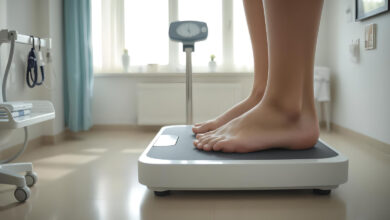(My) Top 5 Diet Books

Did you know that, according to Nielsen BookScan, around 5 million diet books are sold in the U.S. every year? That’s about half of the total sales in the entire health and fitness category. Think about that for a second—half of all health books bought are dedicated to diets. It’s like everyone’s looking for that one magic solution tucked away in the pages of a best-seller. There’s just something about the promise of a new diet that keeps readers returning, hoping this next book will finally have the answer to feeling and looking better.
So, why would you pick up a diet book for yourself? Maybe you’re aiming to change your habits or just looking for fresh inspiration on how to approach food and health. Some of us are curious about the latest health trends; others just want a straightforward plan that feels doable. Whatever the reason, diet books offer a quick way to dive into a structured approach to health—something that can make all the difference when you’re trying to figure out where to start. Plus, they can provide guidance, motivation, and sometimes even a little entertainment along the way.
Here are my top 5 diet books if you’re on the hunt for something like that!
1. Good Calories, Bad Calories: Fats, Carbs, and the Controversial Science of Diet and Health by Gary Taubes
ISBN-10: 1400033462
ISBN-13: 978-1400033461

In Good Calories, Bad Calories, called “a very important book” by Andrew Weil and “destined to change the way we think about food” by Michael Pollan, award-winning science writer Gary Taubes challenges much of what we think we know about diet and health. After seven years of research, Taubes argues that the real health culprit isn’t dietary fat but rather refined carbohydrates—like white flour, sugar, and starchy foods—that are to blame for rising rates of obesity and diabetes. He explains that it’s not about how much we eat but what we eat; some calories (“good calories”) are far healthier than others (“bad calories”).
Taubes explains that “good calories” come from foods low in easily digestible carbs and sugars—like meat, fish, eggs, butter, and non-starchy veggies—which can be enjoyed freely. “Bad calories,” on the other hand, are found in foods that spike insulin levels and encourage weight gain, such as breads, sugary drinks, processed foods, and even some fruits like bananas. He questions why the traditional view of carbs as harmless formed in the 1960s and makes a case that limiting carbs, rather than focusing on low-fat diets, is key to achieving better health.
Referencing decades of clinical research, Taubes highlights evidence that contradicts the common assumptions about fat and cholesterol, suggesting they may not be as harmful as once thought. He argues that by reducing carbohydrates—or at least choosing them wisely—many people can enjoy lasting health benefits, from weight loss to lower disease risk. This book reframes the diet debate and leaves readers questioning the real impact of what they’re putting on their plates.
It is well-researched but a bit of a slog, as the author meticulously goes through countless medical studies to back up his points; admittedly, this might be somewhat boring to read. Still, the book was definitely thought-provoking and thus makes it to my top 5 five diet books.
2. More Than A Body: Your Body Is an Instrument, Not an Ornament by Lexie Kite and Lindsay Kite
ISBN-10: 0358229243
ISBN-13: 978-0358229247

The Kite sisters, both having a Ph.D. in communication with a focus on body image and media, bring their research and personal experiences to challenge typical beauty standards in their book More Than A Body: Your Body Is an Instrument, Not an Ornament. Their goal? To empower readers to see their bodies in a new, healthier way. At the core of the book is a powerful message: “your body is an instrument, not an ornament.” Each chapter reinforces this idea, encouraging readers to see their bodies as tools for living and enjoying life, not objects to be judged.
The book is structured in easy-to-follow sections, guiding readers from understanding body image issues to spotting harmful influences and finally to building a positive relationship with their bodies. The Kite sisters blend solid research with relatable stories and actionable advice, making their insights feel both credible and friendly. Their writing is accessible and engaging, striking a balance between informative and encouraging.
This book’s foundation in research makes it shine, with each insight backed by studies and real data. The Kite sisters also add authenticity with their personal stories, making the book feel like a supportive conversation. From practical exercises to self-compassion techniques, the book provides valuable tools for anyone looking to break free from limiting beauty standards. Whether you’re new to body positivity or looking for deeper insights, More than a Body is a valuable guide to a healthier, more empowered view of yourself.
As a man, I’m thrilled I picked up this book. While it’s packed with academic insights, everything is presented in a way that’s easy to follow. Dr. Kite and Dr. Kite helped me gain a better understanding of how outside influences shape my self-view and self-respect. This book has helped me appreciate women more and deepened my empathy for many of the challenges they face. Definelty qualifies to be on my top 5 diet books list.
3. The Fast Diet Recipe Book: 150 Delicious, Calorie-Controlled Meals To Make Your Fasting Days Easy by Mimi Spencer and Sarah Schenker
ISBN-10: 1476749191
ISBN-13: 9781476749198

The FastDiet Cookbook is the perfect companion to the bestselling diet plan, The FastDiet, which became a global hit for its straightforward approach to weight loss and health. The idea is straightforward: eat normally five days a week, and on two “fast” days, cut down to 500 calories (600 for men). Dr. Michael Mosley, the creator, says it’s less about fasting and more about giving your body a short break from the usual routine.
This cookbook offers over 150 low-calorie recipes created by FastDiet co-author Mimi Spencer and nutritionist Dr. Sarah Schenker, making it easy to plan your fast days. From quick breakfasts to hearty dinners, these recipes are crafted to fill you up without going over the calorie limit. You’ll find various meal ideas, including soups, meat and fish dishes, all designed to help keep hunger at bay while still being satisfying and nutritious.
Along with menu plans, quick meal options, and pantry essentials, the cookbook introduces FastDiet and explains the science-backed benefits, from weight loss to reduced risks of diabetes and heart disease. With the FastDiet Cookbook, planning your fast days becomes effortless, so you can focus on enjoying delicious meals while staying on track with your health goals.
If you’re embracing intermittent fasting as a long-term lifestyle rather than a short-term trend, this book is an excellent resource. Unlike the original Fast Diet book, it expands the range of ingredients and includes recipes for multiple servings, making meals feel more enjoyable and less like “survival mode.” The recipes invite experimentation too, encouraging you to swap ingredients based on preference and availability. Plus, the book itself is beautifully printed, with high-quality paper and impressive photography that adds to the experience.
4. Dirty Genes: A Breakthrough Program to Treat the Root Cause of Illness and Optimize Your Health by Ben Lynch
ISBN 10: 0062698141
ISBN 13: 9780062698148

In an age overloaded with questionable technology, Dr. Ben Lynch emphasizes the importance of starting with the fundamentals in his self-help book Dirty Genes. This guide is tailored for the general public but also serves as a valuable resource for specialists looking to grasp the essentials of the rapidly evolving field of nutrigenomics. Lynch reminds us that a healthy, balanced lifestyle is irreplaceable, no matter how advanced our medical tools have become.
Nutrigenomics explores the relationship between an individual’s genetic makeup and nutritional biochemistry, aiming for personalized and precision medicine. Health and tech companies like 23andMe and Ancestry.com promise improved clinical outcomes through strategies derived from analyzing genetic data. However, the reliability of this genetic information is crucial, as peer-reviewed studies validating the effectiveness of single nucleotide polymorphism (SNP) modulation are currently scarce.
As a seasoned naturopathic physician based in Seattle, Dr. Lynch has established himself as an expert in integrative nutrigenomics. He offers various online training programs and a yearly conference through his Seeking Health Education Institute. He is a crucial resource for those looking to deepen their understanding of this field. Importantly, Lynch does not claim that merely addressing the “dirty genes” will enhance patient outcomes. Instead, he advocates for a two-week lifestyle intervention to improve resilience and reduce environmental factors that may exacerbate genetic expressions before implementing targeted strategies.
While Dirty Genes serves as an introduction to common SNPs and their dietary implications, it underscores that nutrition alone cannot guarantee optimal health. Lynch highlights the significance of epigenetic factors—mental, emotional, and environmental—as critical contributors to disease. Though the book provides evidence-based dietary and lifestyle recommendations tailored to specific genetic variants, it also encourages a holistic view of health. While not every clinician may require this resource, having it on hand can enhance patient outcomes, especially for those resistant to traditional treatments.
“Dirty Genes powerfully challenges the notion that genes are the final arbiters of health and disease. Dr. Ben Lynch skillfully reveals how leveraging specific lifestyle choices can help re-write our health destiny.” — David Perlmutter M.D., #1 New York Times bestselling author of Grain Brain and The Grain Brain Whole Life Plan.
I appreciated the author’s thorough explanation of how different aspects of our genes can uniquely impact each individual. This insight was enlightening, as I hadn’t realized how specific genes could influence behaviors and bodily responses, particularly when these genes aren’t functioning correctly. The concept of epigenetics is crucial, and I believe more people should be informed about it. I thoroughly enjoyed reading this book and discovering how certain genes can become blocked or damaged by various chemicals, foods, and environmental factors.
5. The Big Fat Surprise: Why Butter, Meat and Cheese Belong in a Healthy Diet by Nina Teicholz
ISBN 10: 1451624433
ISBN 13: 9781451624434

In The Big Fat Surprise, investigative journalist Nina Teicholz challenges the prevailing beliefs about dietary fat, asserting that much of what we’ve been taught is incorrect. She meticulously chronicles how decades of low-fat dietary recommendations have effectively turned the population into subjects of a large-scale, uncontrolled health experiment, leading to alarming increases in obesity, diabetes, and heart disease. Teicholz raises provocative questions about the validity of these dietary guidelines, suggesting that the very foods we’ve been taught to avoid—such as creamy cheeses and juicy steaks—could actually hold the key to reversing this health crisis.
Drawing on nine years of research, Teicholz reveals how misconceptions surrounding saturated fats took root in both the scientific community and public perception. She argues that the popular Mediterranean diet may not be as healthy as once believed and warns that replacing trans fats could lead us to even more harmful dietary choices. Her exploration highlights how bias, ego, and premature consensus among researchers have led to significant misrepresentations in nutrition science, creating a dangerous framework that has influenced dietary dogma for generations.
Teicholz’s compelling narrative provides a paradigm shift, advocating for an increase in dietary fat consumption—including saturated fat—as a pathway to improved health. Supported by recent scientific findings, she asserts that foods like meat, cheese, whole milk, and eggs, long deemed unhealthy, can be reintroduced into our diets without guilt. By doing so, The Big Fat Surprise encourages readers to rethink their approach to nutrition and embrace the health benefits of dietary fat.
“This book should be read by every nutritional science professional as a guide to risks of hubris and the unquestioning belief in whatever the conventional wisdom of the day is and to the consequences of basing public policy on belief as opposed to evidence of positive, beneficial effects. All scientists should read it as an example of how limited science can become federal policy, which may, in the long run, be harmful when the basic tenets of science, skepticism, and consistent questioning are set aside to appease the powerful voices convinced that we must do something (even if we do not have the proof that something is the right something)” — Donald J McNamara.
The Big Fat Surprise presents a comprehensive and thought-provoking collection of information that challenges the low-fat, heart-healthy diet hypothesis, revealing that it lacks a solid scientific foundation. In fact, the author argues that this dietary approach may actually contribute to the very health issues it was intended to address.
In conclusion, this selection of the top 5 diet books reflects a personal journey shaped by my unique experiences and preferences. This list is not a definitive ranking of the “best” diet books, as each person’s journey is different, and what works for one may not work for another. I encourage readers to explore these options as starting points, keeping in mind that the best diet book is the one that truly fits their personal goals, values, and motivations.




